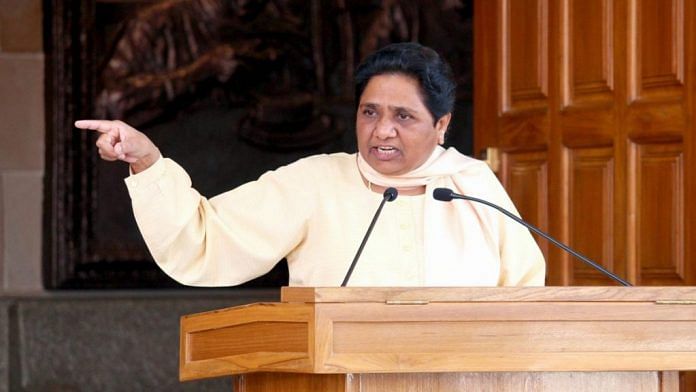The Bahujan Samaj Party has declared candidates for all 403 assembly constituencies of Uttar Pradesh. Unlike the Bharatiya Janata Party and the Samajwadi Party, Mayawati’s BSP is contesting alone on all seats. It has, however, formed alliance with the Akali Dal in Punjab.
The BSP, in its early days, mobilised voters directly on the basis of their caste with its founder president Kanshiram known for quoting caste-ticket distribution details in his election rallies. This practice, it is argued, forced other politicians to nominate candidates from different caste groups, thus making ‘caste’ an indispensable factor for those studying Indian elections.
Here, I provide an analysis of the caste and community profile of the BSP candidates in Uttar Pradesh. The data has been collected via telephonic conversations with local leaders of the party. The accuracy of the data has been given top priority, but minor errors cannot be ruled out because the BSP is making last-minute changes.
Also read: Brahmin candidates aren’t BJP’s priority for UP. Dominant caste tickets belong to Rajputs
Total candidates’ composition
All candidates selected by the BSP have been divided into four categories — upper castes, Backward Castes, Scheduled Castes and Scheduled Tribes. The party’s vision in its initial years was to represent the interests of SC/ST, Backward Castes, and minorities. But from the mid-1990s onwards, the BSP has seen a shift — nominating candidates from upper castes as well.
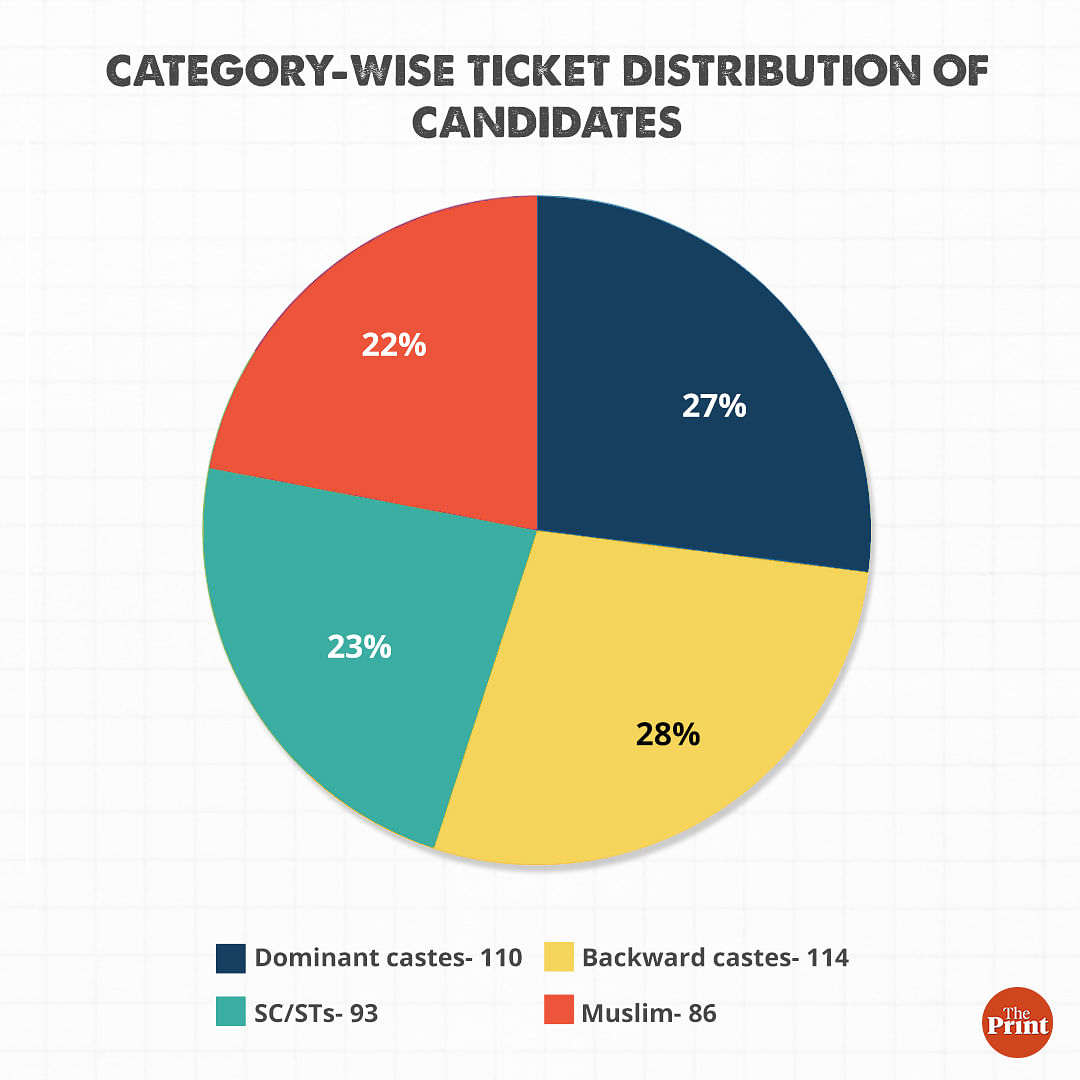
In the ongoing assembly polls, among all four categories, the BSP has nominated its highest number of candidates (114) from backward castes, essentially Hindu backward castes. This is followed by the upper castes, who have been given 111 seats. The party has nominated 86 candidates from the Muslim minority, and 93 SCs and STs. Compared to the BJP and the SP, the BSP has given most tickets to Muslims.
Also read: Samajwadi Party promises social justice, but look who got tickets in 2022. Not enough Muslims
Nomination within upper castes
The BSP has nominated a total 110 candidates from the so-called upper castes: Brahmins (70), Rajputs (28) and Banias (11). The party has just one Bhumihar candidate.
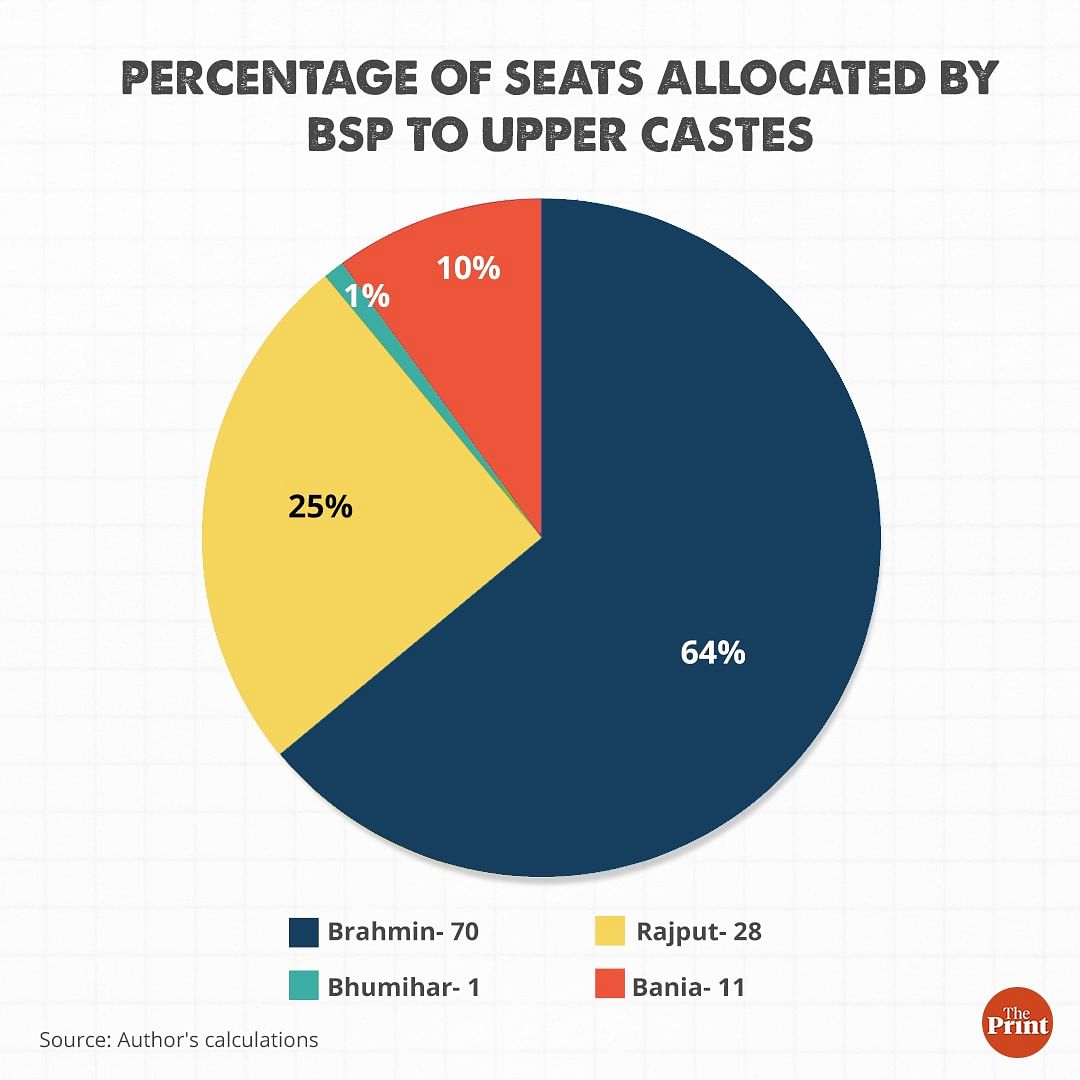
Clearly, the BSP is giving special attention to the Brahmins. This could be in hope that the party repeats its electoral performance of 2007 assembly election, in which the Brahmins had played a big role in bringing Mayawati to power.
Distribution within Backward Castes
The BSP has given the highest number of tickets to the Backward Caste candidates. In this category, most tickets have gone to Kurmis/Sainthwar (24) despite Apana Dal (S) and Apana Dal (K) emerging as Kurmi-centric parties. Yadavs, with 18 tickets, come next. Again, BSP has prioritised Yadavs despite knowing their strong allegiance to the SP. The party has given 17 tickets to the Maurya, Kushwaha, Sakya and Saini communities. This social group was once considered one of the strongest voting blocs of the BSP before it started moving towards the BJP in the 2014 general election.
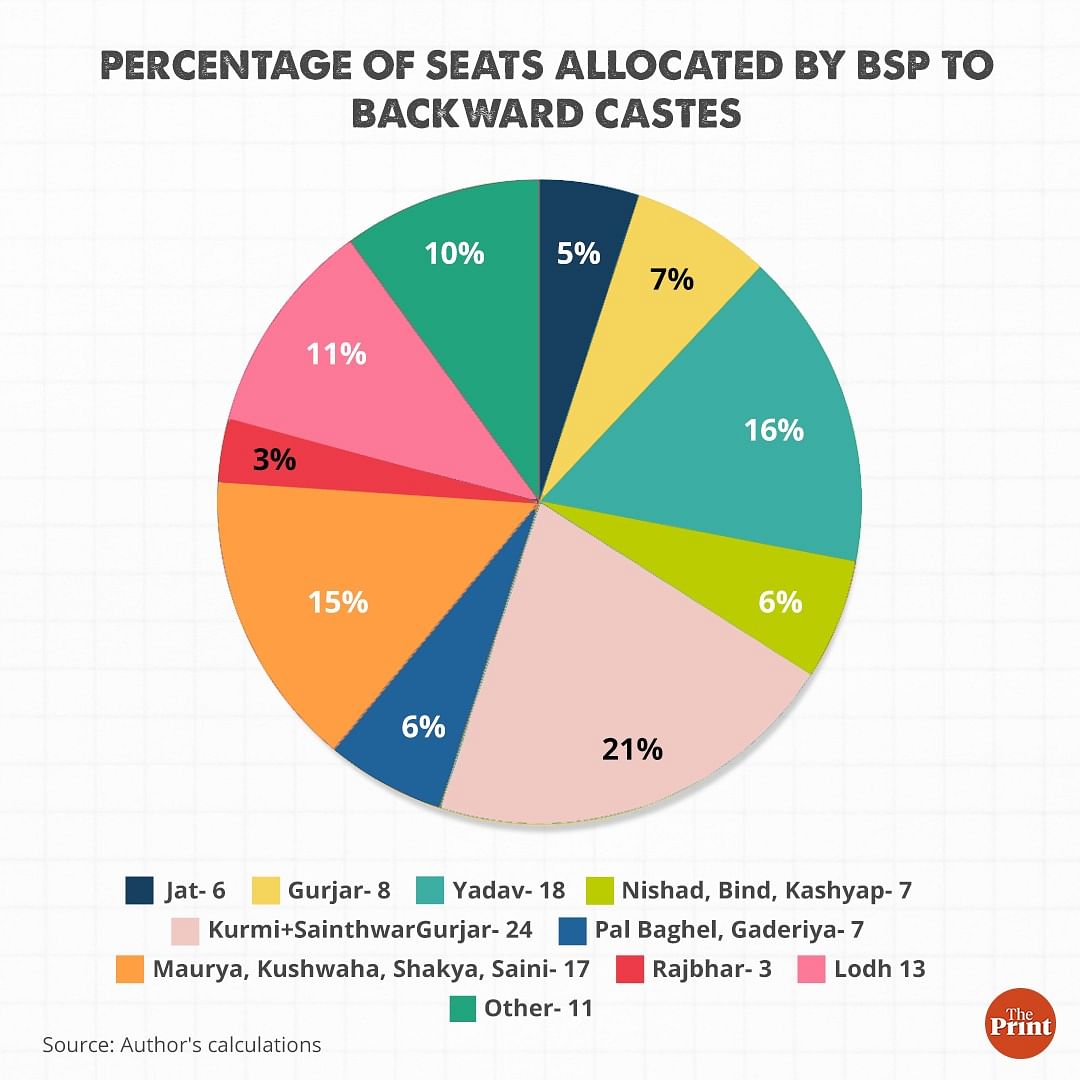
Lodh caste is considered one of the strongest supporters of the BJP, but even BSP has given them 13 seats. While Gurjars and Pals/Baghels/Gaderiyas have received eight and seven seats respectively, Nishads/Kashyaps/Binds share seven seats between them. The Rajbhars, who used to form a strong support base of the BSP, have been given three seats. Rest of the Backward Castes have been given 11 seats.
Also read: Uttarakhand SCs boycott Brahmin cook’s food. It’s more effective than untouchability laws
Scheduled Castes/Scheduled Tribes
The BSP has fielded 93 candidates from the SC/ST communities. Apart from the 86 constituencies that are reserved for the SC/ST categories in the state, the BSP has fielded seven SC/ST candidates on unreserved seats too: Saharanpur, Sahibabad, Karhal, Bareilly Cant, Govind Nagar, Kursi, and Dariyabad.
A further breakdown of BSP’s ticket distribution to the SC/SC community reveals that the party has given most tickets to the Jatavs/Chamars who constitute around 54.23 per cent of the SC/ST mix in UP. While the BSP is fielding 13 Pasi candidates, Dhobis have to settle for four tickets. Ten tickets have gone to remaining SCs/STs such as Kori (01), Khatik (01), Balmiki (02), Dhanuk (01), Jaiswar (01), Beldar (01), Kharwar (02), and Chero (01).
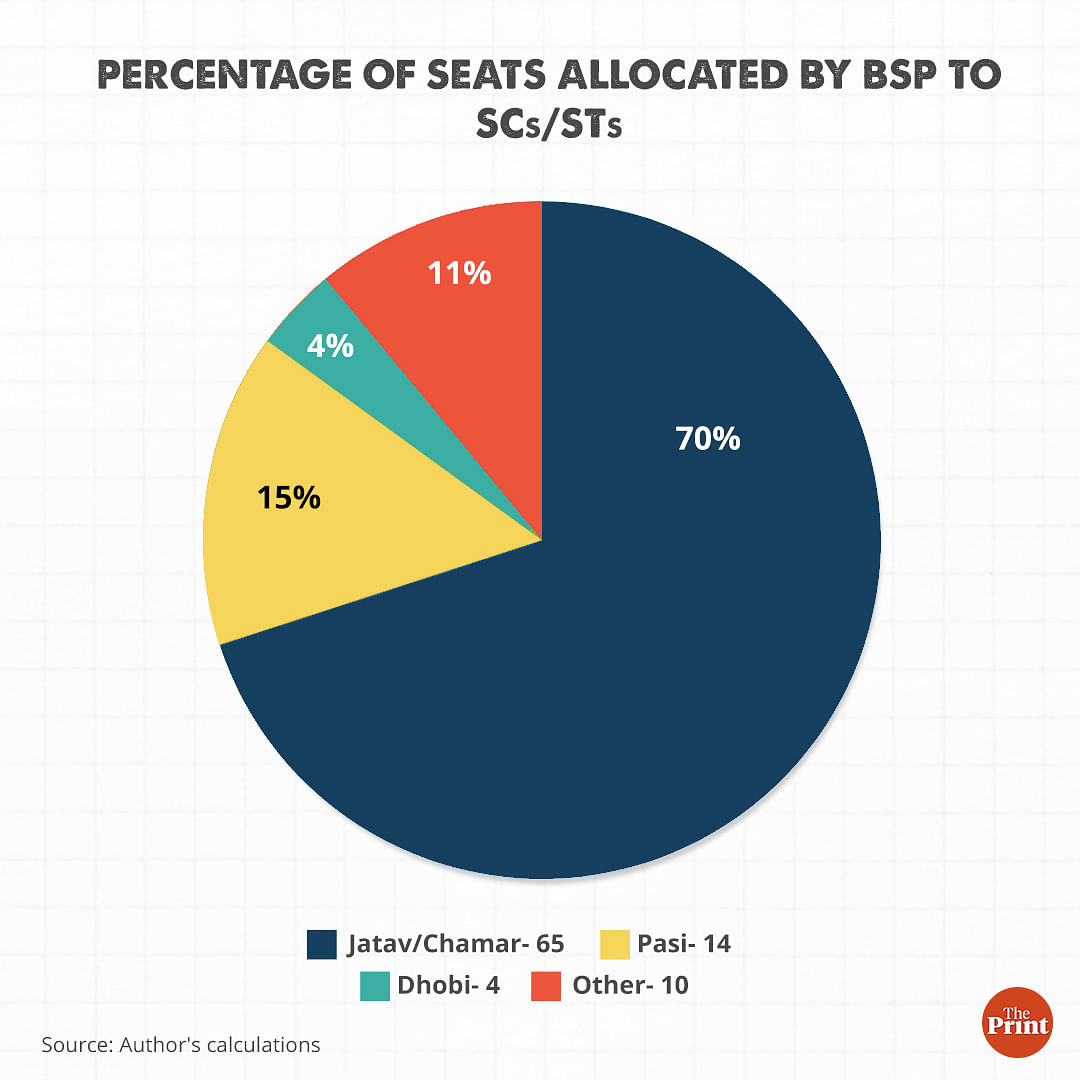
There are 66 castes in the SC list and 16 castes and communities in the ST list. Though the BSP claims to be true representatives of these communities, the party struggled to provide the rightful representation to all castes and communities of SC and ST lists. Same is the case with other parties as well.
With most tickets going to Muslims, Brahmins, and Jatav/Chamars, the BSP seems to be imitating a strategy of the Congress that the party had adopted in the 1980s — the ‘coalition of extremes’.
Arvind Kumar (@arvind_kumar__), PhD in Politics, Royal Holloway, University of London. Views are personal.
Read all of Arvind Kumar’s articles on ticket distribution in UP elections here.
(Edited by Anurag Chaubey)


